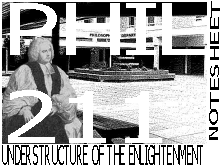 Descartes 4
Descartes 4
'I do not see how God could be understood to be anything but a deceiver if these ideas [that sense gives us] were transmitted by a source other than corporeal things. It follows that corporeal things exist.' Meditation 6.
· God is not a deceiver
· We believe external objects cause our sense experience
· If we were wrong about this, our Creator would have to bear responsibility
for deceiving us.
· Therefore we are not wrong and external objects exist.
One meaning is: a substance is a thing, in contrast to the properties of a thing.
'By substance we can understand nothing other than a thing which exists in
such a way as to depend on no other thing for its existence.'
Principles of Philosophy 1.51 Cottingham, p.177.
Is there a connection between what is independent and what is real?
Different classes of reality - independent things have strong reality and dependent things reality in a weaker form?
The term 'ontology'
Ontology is a branch of philosophy 'which concerns itself with what exists' (Blackburn's Dictionary).
Descartes says that whatever is independent of everything else is a substance.
So Descartes has in fact a hierarchy of reality:
· God
· Things that depend only on God
· Things that depend on God but also on other things - 'properties'.
What substances are there?
For Descartes the one substance was God; but other than God, there are two substances in effect: body (corporeal substance) and mind.
Corporeal substance
Descartes thinks of the Universe as a continuum of corporeal substance.
Cartesian corporeal substance contrasted with atomism (Cordemoy)
Descartes thinks there is local differentiated movements in the continuum, and it is these that are the grounding of the things of our ordinary experience - the theory of 'vortices'.
The nature of corporeal substance is pure extension.
He argues for this by 'thinking away' all other properties.
'weight, colour, and all other such qualities that are perceived by the senses as being in corporeal matter, can be removed from it, while the matter itself remains intact; it thus follows that its nature does not depend on any of these qualities.' Principles II 4.
Is resistance or 'hardness' a special case? Can you imagine a corporeal body which offers no resistance when you move to touch it, or push it out of the way? He says Yes, arguing in the following way:
Suppose I go to touch a body and it takes itself off exactly as my hand moves up to it. I don't sense resistance or 'hardness'. But the body retains its nature. Therefore hardness cannot be part of that nature.
The only property that cannot be 'removed' from matter in this way is extension, and this therefore is its defining property.
'The nature of matter, or body considered in general, consists not in its being something which is hard or heavy or coloured, or which affects the senses in any way, but simply in its being something which is extended in length, breadth and depth.' Principles I 4.
Descartes' corporeal substance is thus extension, or space.
This has the extraordinary implication that space is body.
The universe is a 'single, indefinitely modifiable, infinitely extended thing'
for Descartes (C, p.85.)
'the extension constituting the nature of a body is exactly the same as that
constituting the nature of a space.' Principles II 11.
'There is no difference between the extension of a space ... and the extension
of a body. For body's being extended in length, breadth and depth in itself
warrants the conclusion that it is a substance, since it is a complete contradiction
that a particular extension should belong to nothing; and the same conclusion
must be drawn with respect to a space that is supposed to be a vacuum, namely
that since there is extension in it, there must necessarily be substance in
it as well.' Principles II 16.
C p.86.
If corporeal substance is pure extension, it is to be studied by geometry
Argument that 'a distinct understanding of wax' cannot be got through the senses.
'Let us take ... [a] piece of wax. It has just been taken from the honeycomb; it has not yet quite lost the taste of the honey; it retains some of the scent of the flowers from which it was gathered; its colour, shape and size are plain to see; it is hard, cold and can be handled without difficulty; if you rap it with your knuckle it makes a sound.' Meditation 2 Cottingham p.84.
But then imagine it melting. All these features disappear, and others take their place.
He concludes that 'a distinct understanding of wax' cannot be got through the senses.
'There are two orders of reality or of existence: anything that exists or has some degree of reality - whether substance, attribute, or mode; whether created or uncreated; whether dependent or independent - exists either as a body, as part of corporeal, extended, reality, or as mind, as part of 'incorporeal' , 'spiritual', thinking reality.'
Hobbes: 'mind is nothing more than motion occurring in various parts of an organic body.'
Mersenne: What if
'it turned out to be a body which, by its various motions and encounters, produces what we call thought? How do you demonstrate that a body is incapable of thinking, or that corporeal motions are not in fact thought? the whole system of your body, which you think you have excluded, or else some of its parts - for example those which make up the brain - may combine to produce the motions which we call thoughts.'
W. p.21,2.
VP